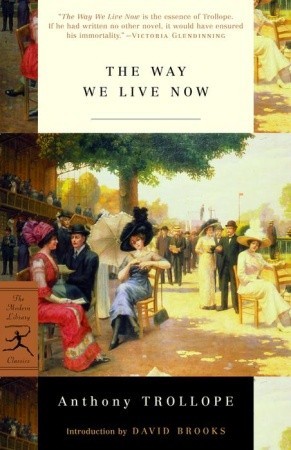In order to provide a short break from posting news on the blog, I’ve decided to feature a book blog this month about a novel I recently read for the first time: The Way We Live Now by Anthony Trollope. Although I hadn’t intended to discuss this hefty classic (it ranges in page length, depending on edition, from 800 to over 1000 pages) on 17th Street, by the time I reached the three-quarter mark in my reading, I came to feel that I would be doing this masterpiece of literature a disservice if I did not feature it here. Aside from sharing several themes with the Alienist novels, it also introduces a cast of some of the strongest female characters in all of literature. As a result, it has quickly become one of my favourites; and who knows — if you give it a chance, it might become one of yours, too.
What’s it about?
Written in 1875 after Anthony Trollope returned to England following a two-year trip to Australia, New Zealand, and the United States, The Way We Live Now is a powerful satire of English politics, speculative finance, and society. Originally intended to be a novel about the Carbury family before it morphed into something far grander, The Way We Live Now opens by introducing the reader to the enterprising Lady Carbury who is single-handedly attempting to support her two adult children, Sir Felix and Hetta, through the publication and self-promotion of her first book, a facetiously titled work called Criminal Queens. Throughout the pages that follow, the lives of Lady Carbury and her children, along with those they are connected with, become intertwined with the towering figure of the novel, Augustus Melmotte: financier, aspiring politician, — and swindler.
As we watch as Melmotte’s rise and fall, we gain a new perspective on themes that range from corruption to the role of women in society and the secret world of the family behind closed doors. While it may have been written over one hundred and forty years ago, its masterly presentation of timeless themes and characters makes The Way We Live Now a novel of our own age as much as it is a novel of English society in the early 1870s.
My thoughts
I went into The Way We Live Now with high expectations; however, it would seem that my expectations were not high enough! I’ve read many novels history holds up as “great,” but I can count on one hand the novels that I personally consider to be “masterpieces.” This, I am pleased to say, is one of them. Having previously seen the excellent 2001 miniseries starring David Suchet as Augustus Melmotte, I was already aware of the plot and knew that I would appreciate most of the themes Trollope explores. Although the first hundred pages is somewhat slow while the large cast of characters is introduced (we follow the stories of over ten main characters, in addition to numerous lesser characters), by the half-way point it became so gripping — even though I already knew the plot! — that it would be best described as a “page turner.”
More surprising than this, I hadn’t been expecting to feel quite so emotionally connected to several of the main characters. Trollope deals with difficult subject matter, including emotional and physical abuse, and there were times when I felt so drained that I needed to give myself a break before continuing. Related to this, it’s rare that I come out of a book naming one of the females as my favourite character. It is rarer still that I find a “strong” female character so realistically formed that I am willing to consider her one of my favourite female characters of all time. So you can imagine my delight when I found just such a character in The Way We Live Now.
In order to discuss these subjects in more detail, unfortunately I need to verge into spoiler territory. As a result, this will be a somewhat unusual book blog as I will be ending the spoiler-free section of my thoughts here, and then continuing my discussion (spoilers included) under the link, which also includes a discussion of the themes I feel the novel shares with the Alienist books. If you have not read the book but are interested enough at this point to give it a try, I encourage you to do so and come back to read the rest of my thoughts later to see if you agree with me. However, if you have already read the novel, or don’t care about being spoiled, then by all means read on!
| Continue reading →

